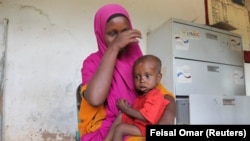The world is currently facing "the highest number of violent conflicts since 1945," according to the United Nations. Globally, two billion people are living in conflict-torn areas and 399 million people in 69 states need humanitarian assistance.
"The world is facing an unprecedented food insecurity crisis," said Samuel Vigersky, Senior Humanitarian Advisor at the United States Mission at the UN.
"On all fronts, the United States is stepping up to do the right thing and meet these urgent, global challenges," he said. "We remain the largest single humanitarian donor, giving [more than] $17 billion in humanitarian assistance in fiscal year 2022."
"In response to the global food insecurity crisis, we have committed nearly $11 billion since Russia’s invasion of Ukraine," said Senior Humanitarian Advisor Vigersky. "We continue to scale assistance for drought response in the Horn of Africa. We’ve doubled funding our commitments there to more than $2 billion in FY 2022."
"Extremely high levels of food insecurity are driving humanitarian need in Afghanistan, where the United States is proud to be the single largest … donor of humanitarian assistance," he said.
"Conflicts account for over 80 percent of humanitarian needs globally," said Senior Humanitarian Advisor Vigersky. "The answer is not more violence. We need political solutions. We need to engage more effectively in diplomatic negotiations regionally and globally, bilaterally and multilaterally, in our capitols and at the UN, to bring parties together and end these conflicts.”
"In the meantime, we are dismayed by the increase in violence against humanitarian personnel, as well as by the continued obstruction of humanitarian access by parties to conflict. "We must defend those doing the difficult, dangerous, and necessary humanitarian work, especially locally recruited personnel," said Senior Humanitarian Advisor Vigersky.
"In Ethiopia, … the persistent presence of Eritrean forces and bureaucratic impediments are still impeding aid to vulnerable populations in need, including survivors of widespread gender-based violence," he said. "In Yemen, the long-term solution to the food insecurity crisis is lasting peace. We must do more to press all parties to the conflict, especially the Houthis, to comply with international humanitarian law."
"In Syria, attacks by the Assad regime have killed humanitarian personnel and destroyed their facilities. The Assad regime continues to impede the flow of humanitarian aid to people in need around the country."
"Across all conflicts, we must promote accountability, consistent with international law," said Senior Humanitarian Advisor Vigersky. "We can and should do everything we can to live up to our highest aspirations."






